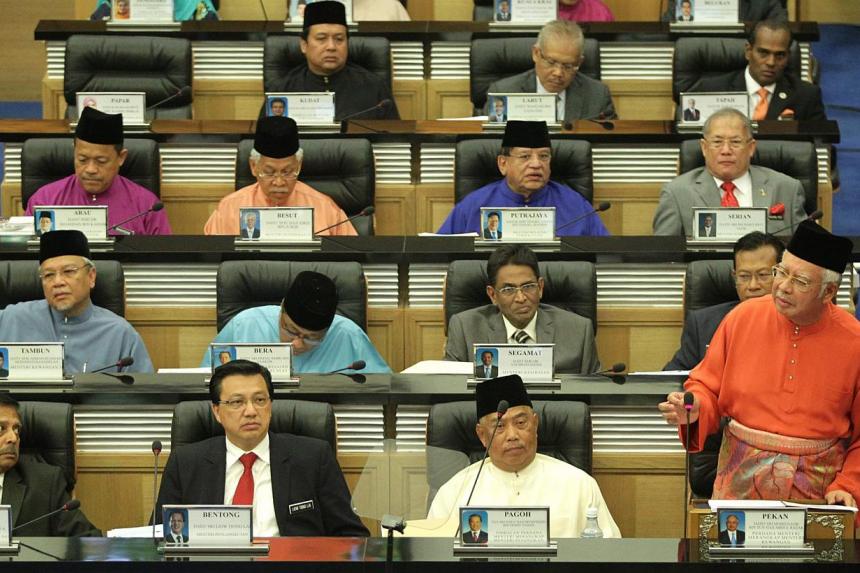MALAYSIAN Prime Minister Najib Razak lowered income taxes and increased financial aid to poor families yesterday as he announced the government is going ahead with an unpopular consumption tax that will raise inflation next year.
The government is also embarking on highway and rail projects worth at least RM75 billion (S$29.4 billion) to keep the economy growing at between 5 and 6 per cent next year, from an estimated 5.5 to 6 per cent this year, he announced in his 2015 budget speech.
The 6 per cent goods and services tax (GST) to be introduced from April will boost inflation to 4 to 5 per cent next year from 3.3 per cent this year, but analysts say the shift to the new broad-based indirect tax is a "long-term investment" in the country's economic and fiscal health.
"Consolidating the fiscal deficit is a moral responsibility of our generation. What is good for the economy is also good for the people," Datuk Seri Najib said in a speech broadcast live over television and radio.
The GST will help the government reduce its persistent budget deficit to 3 per cent next year, from 3.5 per cent this year, as it collects higher revenues.
In total, Mr Najib said his administration will spend RM274 billion next year - with RM50.5 billion in development expenditure - against RM235 billion in revenue next year.
To reduce the impact of the new tax, Mr Najib, who is also the Finance Minister, listed a slew of initiatives which included reducing personal and corporate income taxes, and expanding financial aid to low-income families.
Corporate income tax will be reduced by 1 percentage point beginning 2016, and personal income tax will be slashed by 1 to 3 points next year, dropping up to 300,000 individuals from tax liability.
Mr Najib sought to assure the rakyat- Malay for "people" - that they would not face a sharp rise in living costs.
"The government gives top priority to the rakyat particularly in terms of their daily cost of living," he said.
He expanded the list of goods exempted from GST to include petrol, diesel and cooking gas, essential medicines, breads and noodles.
"We are seeing the shift of reliance from direct to indirect tax. Revenue from direct taxes is vulnerable to external factors whereas GST is more internal, so revenue stream is consistent. It's an investment for the future," Mr Alan Tan, chief economist for Affin Hwang, told The Straits Times.
While Mr Najib warned of further subsidy cuts, especially to fuel, he did not offer details of a more targeted subsidy regime.
Analysts said moving to such a system was a must if the government wants to continue protecting the pockets of the poor while cutting the subsidy bill, but one economist said that if oil prices continue to fall, fuel prices need not rise at all.
The government on Oct 1 raised petrol and diesel prices at the pump by 20 sen to RM2.30 and RM2.20 a litre, respectively.
The Finance Ministry's economic report outlined a reduction of over 7 per cent in overall subsidy and cash assistance to RM37.7 billion next year, from RM40.6 billion this year.

